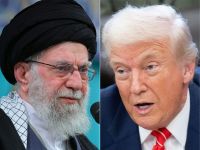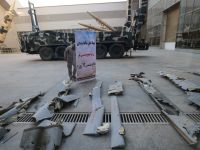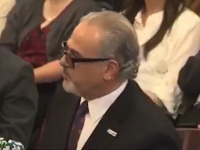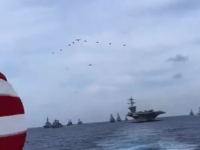President Barack Obama has vowed boldly to “degrade and destroy” the radical Sunni militant movement in Syria and Iraq that said this week it had taken the life of a second American journalist but then characteristically signalled that he will not be rushed into military action - by them or anyone else.
“Their horrific acts only unite us as a country and stiffen our resolve to take the fight against these terrorists,” Mr Obama said during a one-day visit to Estonia. “Those who make the mistake of harming Americans will learn that we will not forget, and that our reach is long and that justice will be served.”
There was no detail, however, on how he would tackle Isis or how other allies might participate in any expanded military operations and, crucially, on whether these operations would extend to the launching of air strikes on its safe havens inside Syria.
As he took questions at a press conference in Tallinn, Mr Obama’s instincts for caution and preparedness over passion and haste were on ample display.
Mr Obama’s instincts for caution and preparedness over passion and haste were on ample display.
“It’s going to take time for us to be able to roll them back,” he said. Using an alternative acronym for the force that in recent months has consumed large swathes of Syria and Iraq, he added: “We know that if we are joined by the international community, we can continue to shrink Isil’s sphere of influence, its effectiveness, its financing, its military capabilities, to the point where it’s a manageable problem.”
The release on Tuesday of a video of the beheading of the second journalist, Steven Sotloff, a freelance reporter, seemed timed to unsteady Mr Obama as he left Washington for Estonia where he had meant to give full attention to the crisis in eastern Ukraine and offer security reassurances to the Baltics. It was certain also to scramble the Nato summit in Wales which also can no longer have Ukraine as its sole focus.
Mr Obama’s competence as the leader not just of the United States but of the world is under scrutiny as never before. At home he has been criticised even by some of his own supporters for an approach that can seem bloodless and detached. After publicly responding to the murder two weeks ago of the first journalist, James Foley, he went to play golf. Last week, he said he didn’t “have a strategy yet” for dealing with Isis.
The portrait of a President buffeted by world events he can neither control and seems sometimes confounded by is also starting to trouble some of America’s allies, including Britain, likely to be the first country to which it will turn when it decides what to do. “We are looking for the leader of the free world to give a lead,” one Government minister said, asking not to be named. “So far, there is nothing.”
There is concern that Mr Obama’s past commitment to ending the US engagement in Afghanistan and Iraq is blurring his judgement now. “I think he bears a burden with respect to the past,” noted Labour’s former Foreign Secretary Jack Straw. “As much as I respect him, I think he’s very long on analysis, but he’s not quite as fleet of foot on being decisive and you need a balance if you’re the President of the United States.”
Mr Obama’s suggestion that he could turn Isis into a “manageable problem” was once again exercising his many critics at home. “When you hear the President talk about destroy and degrade, that makes sense. When you hear the President talking about managing the problem, that doesn’t make sense,” conservative pundit Laura Ingraham said on Fox News. “This is not a manageable problem, this is a force of evil.”
The two-day Nato summit is being hastily revised to discuss what further action could be taken by Nato to bolster existing operations by member states, including the supply of military equipment to Kurdish forces, humanitarian aid to besieged communities and further help on intelligence and surveillance operations. The crucial unanswered question is whether Mr Obama will ask for other member states to join air strikes.
The Prime Minister, David Cameron, last night said he was “not ruling things out, but going forward in a deliberate, sensible, resolute way”. He told ITV News: “We should do what we can to help those on the ground who want to build an Iraq for all Iraqis, Sunni, Shia and Kurds. We’ve helped already with aid. We’ve helped with other military assets, and we’ll always ask ourselves what is in our national interest.”
Earlier today, Mr Cameron chaired a Cobra emergency committee of ministers, police chiefs and the security services. It had been called in part because the video of the murder of Mr Sotloff also contained a threat to execute another hostage of British nationality. After the meeting, the Foreign Secretary, Philip Hammond, said the Government would look at “every possible option to protect this person”.
Mr Hammond was asked if Britain would seek to “extricate” the hostage – and he referred to a previous failed attempt to rescue him that was made public after the murder of US journalist James Foley.
In Parliament, Mr Cameron reiterated Britain’s refusal to pay ransoms terrorists. “At the G8, I launched an initiative to try to get other countries to sign-up to a very clear doctrine that in the case of terrorist kidnap, no ransom should be paid,” he said. “Britain continues with this policy, America continues with this policy but we need to redouble the efforts to make sure that other countries are good to their word.”
While Mr Obama made clear he expects a coalition of states to take on Isis – he and his Secretary of State, John Kerry, will begin the task of corralling allies to the task today in Wales – there will still be pressure on him to demonstrate that at the end of the day it is he and the United States that will lead it.
“If the United States does not mobilise and coordinate a multinational response, one is unlikely to emerge, much less be coherent,” Dennis Ross, the former special advisor to Mr Obama and Middle East peace envoy, wrote in Politico today. “Moreover, the readiness of others in the region to act – overtly and covertly – will depend on seeing what the United States is prepared to do.








